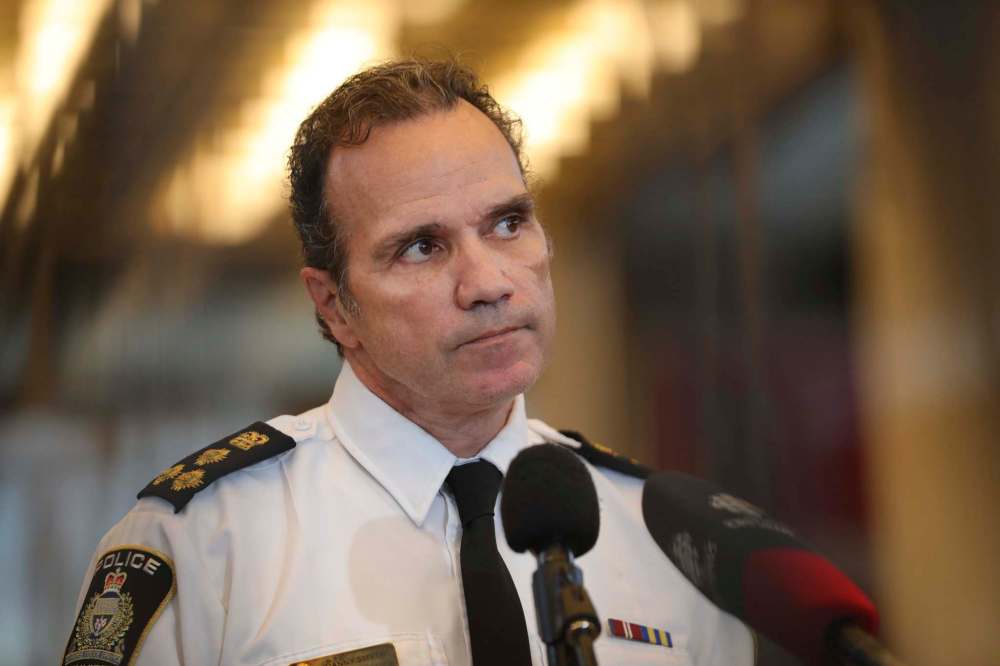City advised to pay $32M for police body-cams
Advertisement
Read this article for free:
or
Already have an account? Log in here »
To continue reading, please subscribe:
Monthly Digital Subscription
$0 for the first 4 weeks*
- Enjoy unlimited reading on winnipegfreepress.com
- Read the E-Edition, our digital replica newspaper
- Access News Break, our award-winning app
- Play interactive puzzles
*No charge for 4 weeks then price increases to the regular rate of $19.00 plus GST every four weeks. Offer available to new and qualified returning subscribers only. Cancel any time.
Monthly Digital Subscription
$4.75/week*
- Enjoy unlimited reading on winnipegfreepress.com
- Read the E-Edition, our digital replica newspaper
- Access News Break, our award-winning app
- Play interactive puzzles
*Billed as $19 plus GST every four weeks. Cancel any time.
To continue reading, please subscribe:
Add Free Press access to your Brandon Sun subscription for only an additional
$1 for the first 4 weeks*
*Your next subscription payment will increase by $1.00 and you will be charged $16.99 plus GST for four weeks. After four weeks, your payment will increase to $23.99 plus GST every four weeks.
Read unlimited articles for free today:
or
Already have an account? Log in here »
Hey there, time traveller!
This article was published 04/06/2021 (1635 days ago), so information in it may no longer be current.
Winnipeg City Council will soon consider a $32-million, multi-year proposal to add body-worn cameras for police.
On Friday, the Winnipeg Police Board unanimously called upon council to approve that investment and refer the final say on funding to the city’s 2022 budget process.
Winnipeg Police Service Chief Danny Smyth said the cameras would increase the service’s transparency and accountability, providing a visual record of officer interactions with the public.

“We all know the saying ‘a picture is worth a thousand words’ and that kind of evidence is huge,” said Smyth.
A WPS report notes the service has sought funding for body-worn cameras for more than a decade. A $1-million pilot project of the devices was slated for 2016 but later cancelled over its cost.
The report said adding the technology now would create valuable records that can display entire police interactions, “which will enhance community trust in police.”
WPS estimates the project would have a capital cost of $6.8 million in 2022, which would reach a combined $32 million by the end of 2027, including video storage. Police expect the change would also create $717,000 of annual operating costs.
Smyth said police would buy separate cameras to record interactions, not the software some police agencies have added to existing smartphones. He said police have not yet determined exactly what type of recording devices officers should use. Some cameras let police turn recordings on or off, while others automatically start taking video whenever an officer pulls out a gun or Taser.
Smyth said the police service can’t afford the program within its existing multi-year budget, unless it cuts other services.
“There is no room in the (police) budget (to find) $32 million,” he said.
Coun. Markus Chambers, chairman of the police board, said the cameras would create a valuable public record of police interactions.
“You can’t deny that it will increase accountability and transparency,” said Chambers.
The councillor said he’s listened to demands from some advocates that council defund the police and instead invest more money into social services. However, he believes a visual record of police interactions is worth its cost.
“It’s not a panacea… but there are opportunities that we get from it, in terms of looking at the interactions that our service does have with citizens and, perhaps, modifying (police) training when it comes to use of force or unconscious bias,” he said.
Chambers said he agrees with Smyth that city hall should pay for the cameras but suggests the city could seek provincial help, since officer video could be used as evidence in court.
Winnipeg police, and other law enforcement agencies, have faced growing scrutiny over the past year, including calls for council to cut the service’s budget.
Bronwyn Dobchuk-Land, who teaches criminal justice at the University of Winnipeg and supports police defunding, urged city council to reject the call to spend millions on body-worn cameras.
“(This is) a reform that puts more money into police department coffers. It gives them more resources, more capacity, more tools at the exact moment that communities are demanding those resources. I think it’s very, very egregious and disappointing and concerning,” said Dobchuk-Land.
She argued video captured by body cams wouldn’t heighten police accountability, especially for cameras that officers have the power to turn on and off.
“It’s… a distraction from the issue of police accountability. It provides this false sense of accountability,” she said.
The city’s executive policy committee is expected to cast the next vote on the body camera proposal on June 16, which would also require council approval.
Joyanne.pursaga@freepress.mb.ca
Twitter: @joyanne_pursaga

Joyanne is city hall reporter for the Winnipeg Free Press. A reporter since 2004, she began covering politics exclusively in 2012, writing on city hall and the Manitoba Legislature for the Winnipeg Sun before joining the Free Press in early 2020. Read more about Joyanne.
Every piece of reporting Joyanne produces is reviewed by an editing team before it is posted online or published in print — part of the Free Press‘s tradition, since 1872, of producing reliable independent journalism. Read more about Free Press’s history and mandate, and learn how our newsroom operates.
Our newsroom depends on a growing audience of readers to power our journalism. If you are not a paid reader, please consider becoming a subscriber.
Our newsroom depends on its audience of readers to power our journalism. Thank you for your support.

